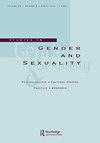Identity Process Treatment Model for Transgender and Gender Nonconforming Clients
Q3 Social Sciences
引用次数: 0
Abstract
ABSTRACT The Identity Process Treatment Model for transgender and gender-nonconforming clients addresses an important development in the identity development models. Specifically, this theory and treatment model provide an alternative or adjunct to existing stage theories. Unique to this model is the ability to understand how the client’s identity is impacted by their day-to-day experiences. We propose that clients adopt an identity style that they rely upon in most situations. In this model we discuss three different identity styles and the style that is expected to be the most adaptable and to promote psychological health across time. A six-step treatment model is provided to guide clinicians providing service to transgender and gender-nonconforming clients. These steps include an assessment period, conceptualizing the client’s identity style, providing psychoeducation to both the client and support system, working toward a more balanced identity style, and consolidating the learning.跨性别及性别不符合来访者的认同过程治疗模式
跨性别和性别不合规客户的身份过程处理模型解决了身份发展模型的一个重要发展。具体而言,这一理论和治疗模式为现有的阶段理论提供了一种替代或辅助。该模型的独特之处在于能够了解客户的身份如何受到日常体验的影响。我们建议客户采用他们在大多数情况下都依赖的身份风格。在这个模型中,我们讨论了三种不同的身份风格,以及预期最具适应性和促进心理健康的风格。提供了一种六步治疗模式,以指导临床医生为跨性别和性别不合规的客户提供服务。这些步骤包括评估期、概念化客户的身份风格、为客户和支持系统提供心理教育、努力实现更平衡的身份风格以及巩固学习。
本文章由计算机程序翻译,如有差异,请以英文原文为准。
求助全文
约1分钟内获得全文
求助全文
来源期刊

Studies in Gender and Sexuality
Social Sciences-Gender Studies
CiteScore
0.80
自引率
0.00%
发文量
15
期刊介绍:
Beginning in the final two decades of the 20th century, the study of gender and sexuality has been revived from a variety of directions: the traditions of feminist scholarship, postclassical and postmodern psychoanalytic theory, developmental research, and cultural studies have all contributed to renewed fascination with those powerfully formative aspects of subjectivity that fall within the rubric of "gender" and "sexuality." Clinicians, for their part, have returned to gender and sexuality with heightened sensitivity to the role of these constructs in the treatment situation, including the richly variegated ways in which assumptions about gender and sexuality enter into our understandings of "normality" and "pathology."
 求助内容:
求助内容: 应助结果提醒方式:
应助结果提醒方式:


